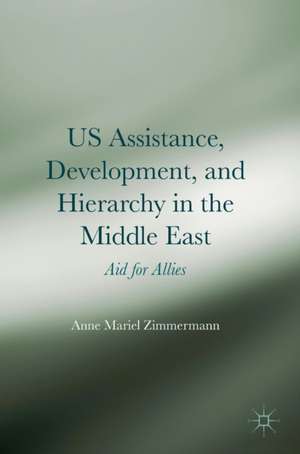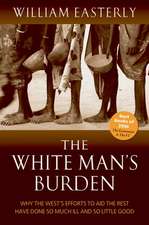US Assistance, Development, and Hierarchy in the Middle East: Aid for Allies
Autor Anne Mariel Zimmermannen Limba Engleză Hardback – 21 dec 2016
| Toate formatele și edițiile | Preț | Express |
|---|---|---|
| Paperback (1) | 718.79 lei 6-8 săpt. | |
| Palgrave Macmillan US – 6 iul 2018 | 718.79 lei 6-8 săpt. | |
| Hardback (1) | 723.35 lei 6-8 săpt. | |
| Palgrave Macmillan US – 21 dec 2016 | 723.35 lei 6-8 săpt. |
Preț: 723.35 lei
Preț vechi: 882.13 lei
-18% Nou
Puncte Express: 1085
Preț estimativ în valută:
138.41€ • 150.82$ • 116.63£
138.41€ • 150.82$ • 116.63£
Carte tipărită la comandă
Livrare economică 23 aprilie-07 mai
Preluare comenzi: 021 569.72.76
Specificații
ISBN-13: 9781349949991
ISBN-10: 134994999X
Pagini: 286
Ilustrații: XIII, 273 p. 12 illus.
Dimensiuni: 148 x 210 x 20 mm
Greutate: 0.48 kg
Ediția:1st ed. 2017
Editura: Palgrave Macmillan US
Colecția Palgrave Macmillan
Locul publicării:New York, United States
ISBN-10: 134994999X
Pagini: 286
Ilustrații: XIII, 273 p. 12 illus.
Dimensiuni: 148 x 210 x 20 mm
Greutate: 0.48 kg
Ediția:1st ed. 2017
Editura: Palgrave Macmillan US
Colecția Palgrave Macmillan
Locul publicării:New York, United States
Cuprins
1. What Does US Aid “Buy” in the Middle East?
2. Aid and the Logic of Political Survival
Unit One: Israel
3. Non-Distributive Survival Strategy
4. Origins of US Aid to Israel
5. US Aid to Israel: Developmental Bargain
Unit Two: Jordan
6. Distributive Survival Strategy
7. Origins of US Aid to Jordan
8. US Aid to Jordan: Geopolitical Bargain
Unit Three: Egypt
9. Hybrid Survival Strategy
10. Origins of US Aid to Egypt
11. US Aid to Egypt: Illusive Bargains
12. Conclusion
Notă biografică
Anne Mariel Zimmermann specializes in comparative political economy and Middle East politics. She was previously Assistant Professor at Wesleyan University, United States, and has also lectured at the University of St. Gallen and the University of Zurich, Switzerland. She received her Ph.D. from the University of Virginia, United States, in 2009.
Textul de pe ultima copertă
What does US aid “buy” in the Middle East? Drawing on extensive primary source research, this book examines the role and consequences of US aid to three countries in the Middle East. The author argues that the political survival strategies of incumbent leaders in Egypt, Israel, and Jordan shaped not only the type of aid that these countries received from the US, but also its developmental and geopolitical impact. Leaders who relied heavily on distributing selective benefits to their ruling coalitions were more likely to receive forms of US aid that complemented their distributive political economies and undermined the state’s developmental capacity, which simultaneously rendered them more dependent on US resources, and more likely to cede fragments of their sovereignty to their major donor. Non-distributive leaders, however, could reap the full benefits of highly discretionary and technologically sophisticated aid, incorporating it into developmental policies that rendered them progressively less dependent on Washington—and better able to say “no” when it was in their best interest.
Caracteristici
Weaves together evolving scholarship on state formation, international hierarchy, and coalition politics to systematically theorize the origins and effectiveness of geopolitically motivated foreign aid
Sheds new light on how political survival strategies of Middle Eastern leaders interacted with US aid to shape important features of Middle Eastern political economy
Provides detailed cases studies of Egypt, Israel, and Jordan to show when and how US aid had an impact on state developmental capacity and sovereignty
Sheds new light on how political survival strategies of Middle Eastern leaders interacted with US aid to shape important features of Middle Eastern political economy
Provides detailed cases studies of Egypt, Israel, and Jordan to show when and how US aid had an impact on state developmental capacity and sovereignty











